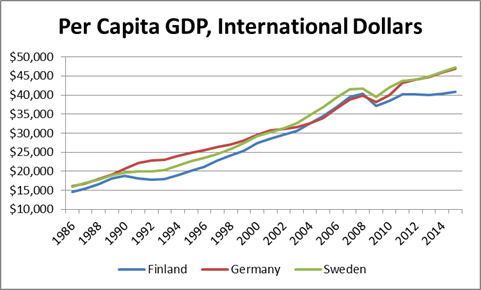Article • Dean Baker’s Beat the Press
Fact-based, data-driven research and analysis to advance democratic debate on vital issues shaping people’s lives.
Center for Economic and Policy Research
1611 Connecticut Ave. NW
Suite 400
Washington, DC 20009
Tel: 202-293-5380
Fax: 202-588-1356
https://cepr.net
That is the conclusion that readers might draw from a piece by Neil Irwin in which he interviews Alexander Stubb, the Finnish finance minister, on the merits of the euro for Finland. Finland is often cited by euro critics because its economy is mired in recession even though, unlike Greece, it has always maintained low budget deficits and its government is not corrupt and highly efficient. The problem cited by critics (including me) is that the being in the euro prevent Finland from devaluing its currency to regain competitiveness.
Stubb dismisses the current weakness as a rough patch:
“You have to look at a longer time horizon. In his telling, the integration with Western Europe — of which the euro currency is a crucial element — deepened trade and diplomatic relations, making Finland both more powerful on the world stage and its industries better connected to the rest of the global economy. That made its people richer.
“‘In the early 1990s in the middle of a Finnish banking crisis and economic depression, we were a top 30 country in the world in per capita G.D.P.,’ he said. ‘Then we opened up; we became members of the E.U. Now we’re always up there in G.D.P. per capita or whatever other measure you look at with Sweden, Denmark, Australia and Canada.’”
Actually, if we look at a slightly longer time horizon, we would find that Finland was actually very close in per capita income to Sweden, Germany, and other rich countries in the 1980s before the collapse of the Soviet Union in the early 1990s.

Source: International Monetary Fund.
Before the collapse of the Soviet Union, Finland’s per capita GDP was roughly 95 percent of the levels in Germany and Sweden. It fell sharply in the early 1990s but was already regaining ground rapidly by the mid-1990s, before the establishment of the euro. Since the recession Finland’s per capita GDP has fallen relative to both countries. It is now lower relative to Sweden, which is not in the euro, than it was at any point in the nineties, following the collapse of the Soviet Union.
Note: An earlier verison had a graph without years on the axis, as several comments notes, this has been corrected.